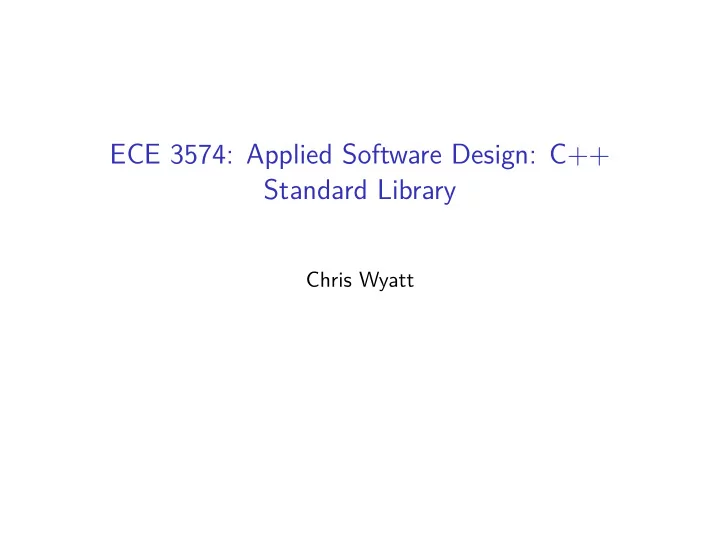

ECE 3574: Applied Software Design: C++ Standard Library Chris Wyatt
The goal of today’s meeting is to review the standard library ◮ Containers and Iterators ◮ Algorithms ◮ Exercise 5 “The best code is that already written and tested”
The C++ standard library is well-constructed and tested ◮ prefer to use containers and algorithms from the standard library rather than hand-coded data structures and algorithms. In 2574 you saw how to implement data structures and common algorithms for sorting and searching. However, the C++ standard library provides implementations of these that are efficient and well tested, so you should prefer to use them over hand-coded approaches whenever feasible.
std::array is a wrapper around raw arrays ◮ supports standard access members (at, [], front, back) ◮ has a size() member ◮ supports fill and swap ◮ can be empty ◮ very low overhead Example: std::array<int,10> a; a.fill(1); assert(a[3] == 1); assert(a.size() == 10);
std::vector is a dynamically sized array-based container ◮ the most useful linear data structure ◮ see members size, capacity, and reserve ◮ grows exponentially ◮ supports insert - much more efficient than you might think ◮ watch out for iterator invalidation Example std::vector<int> v; std::cout << v.capacity() << std::endl; for(int i = 0; i < 100; ++i){ v.push_back(i); std::cout << v.capacity() << std::endl; }
std::deque is a dynamically sized double ended queue ◮ not contiguous in memory ◮ access either end: push_front or push_back ◮ generally better performance than std::list Example: std::deque<int> d; for(int i = 0; i < 100; ++i){ d.push_back(i); d.push_front(i); }
std::list and std::forward_list ◮ doubly and singly linked-lists respectively ◮ constant time insertion anywhere ◮ no random access ◮ std::list supports bidirectional iteration ◮ space efficient, no extra space as in std::vector ◮ less time efficient than std::vector because of cache misses
adaptors provide wrappers around other containers ◮ stack (wraps a deque) ◮ queue (wraps a deque) ◮ priority_queue (a heap using vector for storage)
std::map and std::multimap are dictionaries (key,value) ◮ std::map requires unique keys and value ◮ implemented as red-black tree (balanced binary tree) ◮ index operator[] is very handy Example: std::map<std::string, int> occurances; occurances["hello"] += 1; occurances["hello"] += 1; occurances["goodbye"] += 1; for(auto it = occurances.begin(); it != occurances.end(); ++it) { std::cout << "You said " << it->first << " " << it->second << " times." << std::endl; }
Hash Tables ◮ unordered_set / unordered_map ◮ unordered_multiset / unordered_multimap ◮ constant (amortized) time find, insert, remove Same Example std::unordered_map<std::string, int> occurances; occurances["hello"] += 1; occurances["hello"] += 1; occurances["goodbye"] += 1; for(auto it : occurances) { std::cout << "You said " << it->first << " " << it->second << " times." << std::endl; }
algorithms library ◮ Non-modifying sequence operations ◮ Modifying sequence operations ◮ Partitioning operations ◮ Binary search ◮ Set operations ◮ Heap operations ◮ min/max ◮ numeric (see random number generators too)
Exercise 5 See Website
Next Actions and Reminders ◮ Read The Pragmatic Programmer Sections 7, 8, 26 ◮ Milestone 0 is due Friday.
Recommend
More recommend